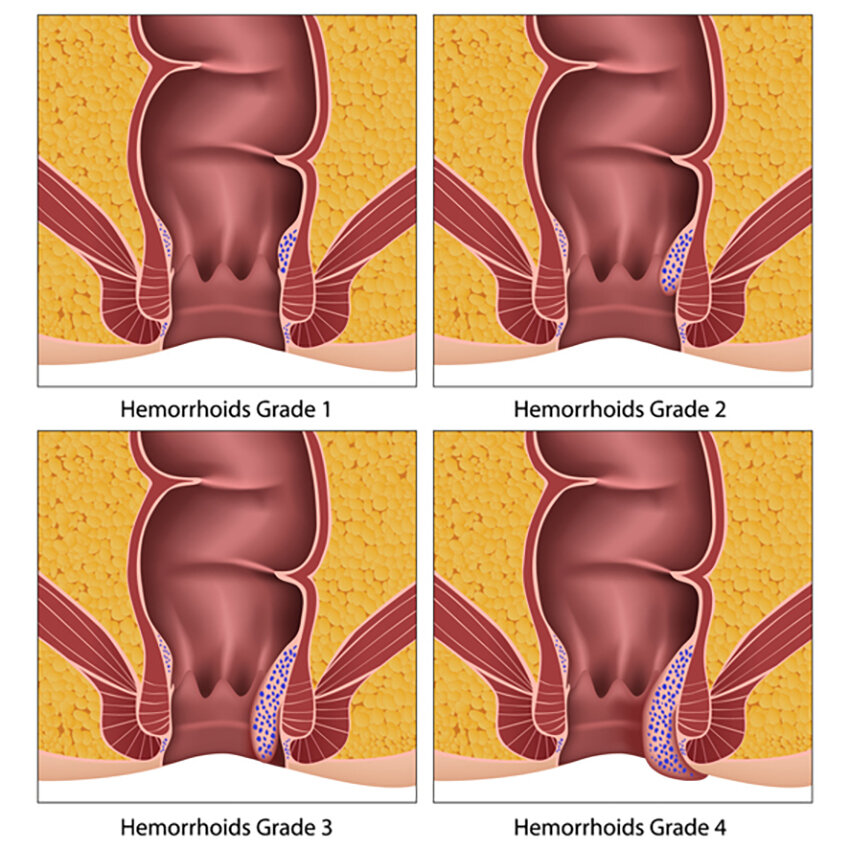Why you should not ignore haemorrhoids
We may not talk about them, but haemorrhoids are a very common problem. They can affect both men and women; and Colorectal Surgeon Dr Terence Chua believes there’s a good chance you will experience haemorrhoids at some stage in your life.
So let’s get to the bottom of why haemorrhoids appear, what you can do to avoid them and why you should not ignore signs of haemorrhoids. (Hint: they will not go away on their own.)
What are haemorrhoids?
Haemorrhoids (also called piles) are lumps inside and around the anal passage (anus). They are swollen blood vessels covered by the lining of the anal canal that enlarge causing symptoms such as bleeding, pain and discomfort.
Haemorrhoids usually start as internal haemorrhoids. As a haemorrhoid gets bigger, it may start to protrude through the anus to become prolapsed. We classify haemorrhoids in four grades:
Grade One: internal haemorrhoids with no prolapse are usually painless. You might notice bright red bleeding after doing a poo.
Grade Two: internal haemorrhoids that are more uncomfortable and start to prolapse.
Grade Three: more severe haemorrhoids with a prolapse that can be manually pushed back inside.
Grade Four: usually the most painful type, haemorrhoids have prolapsed and cannot be pushed back manually.
If you have noticed any symptoms – like bleeding, itching, swelling or external lumps – you should see your GP straight away to get a referral to see an experience practitioner like Colorectal Surgeon Dr Terence Chua who can advise you on different treatments.
Why do we get haemorrhoids?
In medical terms, haemorrhoids are caused by a weakening of the supportive tissues in the anal passage. In real life terms, haemorrhoids are caused by actions or conditions that put additional strain on your bowel habits such as:
Constipation – hard bowel motions that are difficult to pass
Straining to do a poo – due to constipation or bad toileting techniques
Spending too long on the toilet – for example, reading a magazine or looking at your phone
Pregnancy – due to increased pressure on pelvic floor
Aging – haemorrhoids are more common as we get older
Being overweight or regularly lifting heavy objects – puts more pressure on blood vessels
Family history – some hereditary or genetic factors
For women, the most common cause of haemorrhoids is pregnancy. Women may find haemorrhoids that first appear during pregnancy may remain or get worse with subsequent pregnancies. This is due to the increased pressure on the pelvic floor from the baby, increased blood flow throughout the body and hormones that cause blood vessels to soften and enlarge more easily.
For men, contributing factors are more likely to be poor habits like straining to do a poo or spending too long on the toilet. Dr Terence Chua says it’s time to put down the magazine and get your haemorrhoids treated by an experienced colorectal surgeon before they get worse.
What treatment is available for haemorrhoids?
Treatment options for haemorrhoids vary depending on the severity. The longer you wait, the more invasive the treatments become so early intervention is important. Common treatments include:
Haemorrhoid banding
Rubber bands are applied to haemorrhoids to constrict the blood supply resulting in separation of the haemorrhoid in 4-7 days. This procedure is suitable for Grade 1 and 2 internal haemorrhoids.
Haemorrhoidal energy therapy
A non-surgical treatment for internal haemorrhoids that uses heat energy and tissue clamping. Suitable for Grade 1 and 2 internal haemorrhoids. Dr Terence Chua says this technique is often painless for patients.
Haemorrhoidectomy
Surgical treatment for prolapsed external haemorrhoids. This can be a painful surgery that requires 4-6 weeks for complete healing but may be the only treatment option available for larger haemorrhoids.
Haemorrhoidal artery ligation
An alternative treatment for larger haemorrhoids that uses sutures (stiches) to reduce the blood flow and cause haemorrhoids to shrink.
Read more about haemorrhoid surgery with Colorectal Surgeon Dr Terence Chua.
What should I do to avoid haemorrhoids?
Haemorrhoids do not disappear on their own, so if you are already experiencing symptoms of haemorrhoids, ignoring them is not an option. If left alone, your haemorrhoids will likely get worse, your symptoms will get more painful and you may need more invasive surgical treatment.
The most important piece of advice for anyone concerned about haemorrhoids is don’t delay seeking treatment. Haemorrhoids are very common and can be treated more easily in the early stages.
Make an appointment today to see Colorectal Surgeon Dr Terence Chua before your haemorrhoids get worse.


